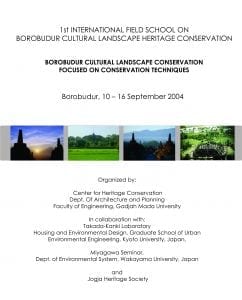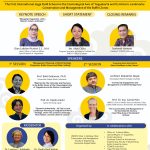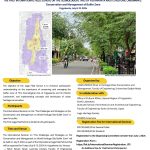BACKGROUND
Saujana heritage or cultural landscape, is the inextricable unity between nature and manmade heritage in space and time or the variety of interactive manifestation between manmade heritage and natural environment. The interaction of nature and culture has become a new perspective in global discourse of sciences especially those which concern with heritage conservation started in the end of the 80’s.
In Indonesia the discourse on cultural landscape has not yet developed. It is even realized that in education the issue has not been a learning material whereas in fact, Indonesia from Sabang to Merauke is a mosaic of one of world’s biggest cultural landscape diversity that needs interdisciplinary handling. That is why conservation and management of cultural landscape are very urgent things to do.
In 2003, Indonesia Network for Heritage Conservation (INHC) in collaboration with International Council on Monuments and Sites (ICOMOS) Indonesia and Ministry of Culture and Tourism in Indonesia Heritage Year 2003 (theme: Celebrating Diversity) declared Indonesian Charter for Heritage Conservation which among other shares the understanding that:
- The heritage of Indonesia is the legacy of nature, culture and saujana, the weave of two. Natural heritage is the construct of nature. Manmade heritage is the legacy of thought, emotion, intentions, and works that spring from over 500 ethnic groups in Tanah Air Indonesia, singularly, and together as one nation, and from the interactions with other cultures throughout its lengths of history. Saujana heritage is the inextricable unity between nature and manmade heritage in space and time.
- Cultural heritage includes both tangible and intangible legacies;
- Heritage, bequeathed from the generations that precede us, is the vital foundation and initial capital for the development of the Indonesian nation in the future, and for these reasons, must be conserved and passed along to the next generation in good condition, without loss of value, and if possible with an enhanced value, to form heritage for the future.
Meanwhile Borobudur UNESCO Expert Meeting held in July 2003 stated that a study on Borobudur cultural landscape is urgent to be conducted and started in 2004 Indonesian Government through Department of Culture and Tourism had prepared 2nd Stage of Borobudur Restoration emphasized on Intangible Cultural Heritage and community empowerment.
In order to response various needs on conservation development, in scientific or practical needs, Center for Heritage Conservation, Department of Architecture and Planning, Gadjah Mada University in collaboration with Takada-Kanki Laboratory Housing and Environmental Design, Graduate School of Urban Environmental Engineering, Kyoto University, Japan, Miyagawa Seminar, Dept. of Environmental System, Wakayama University, Japan and Jogja Heritage Society organize a Field School with case study of Menoreh-Borobudur area, an area with divers heritage from local to class world heritage.
TOPIC OF FIELD SCHOOL
Borobudur Cultural Landscape Conservation Focused on Conservation Techniques
OBJECTIVES
The objectives of the Field School program in general are:
- To give participants a comprehension on conservation and management of cultural landscape, in which include historical buildings, setting and culture system, living culture and other natural environment components
- To enhance participant skill in implementing concepts, methods, conservation process and landscape management in field actual cases.
- To enhance participant interest in cultural landscape conservation.
- To give participants experience in doing a research on cultural landscape conservation directly in the field.
The objective of Field School program in specific is emphasized on enhancing participant skill in implementing techniques of cultural landscape conservation in which include inventory, documentation and presentation to generating design guidelines in a particular area.
TIME AND VENUE
The program is organized for 6 days started on 10 to 16 September 2004 in Borobudur –Menoreh Mountain Range, Magelang Regency, Central Java. During the program participants will stay in homestays in Candirejo Village, Borobudur Subdistrict, Magelang Regency, Central Java
ACTIVITY PROGRAM
During 6 day program, participants will experience fun learning activities such as:
- Field School
- Borobudur Heritage Trail and Sunrise Trip
- Field Survey
- Discussion with local community
- Presentation
- Cultural activities with local community
REGISTRATION AND FEE
Participants can register to:
Center for Heritage Conservation
Department of Architecture and Planning, Faculty of Engineering, Gadjah Mada University
Jl. Grafika 2, Sekip Yogyakarta, Indonesia. Telp. 62 274 544910. Fax: 62 274 580852
Contact Person: Sdri. Sinta. E-mail: she_jogja@yahoo.com, (Sinta)
Registration to the Organizing Committee not later than August 20th , 2004.
Confirmation of participation by September 1st, 2004
Registration Fee Rp 950.000,– for Indonesian students and USD 200 for resident and student outside Indonesia. Registration fee can be transferred to Bank Account:
Sinta Carolina
BANK BNI 46 cabang UGM Yogyakarta, No. 0038671545
Call for Participants of 1st BFS 2004
For more update, please visit our gallery : http://chc.ft.ugm.ac.id/gallery/borobudur-field-school-1-st-2004/




